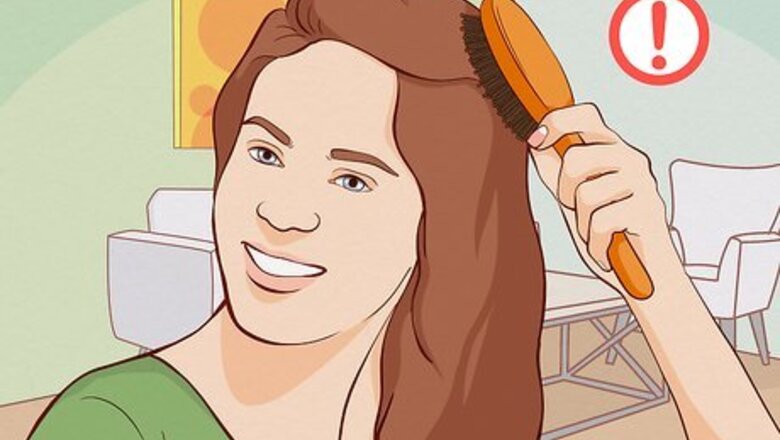
views
Brush your hair from the ends first.
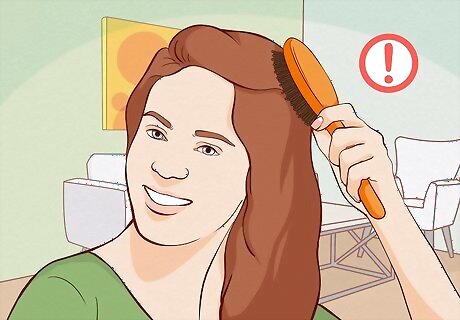
Brushing from the roots can cause breakage at the top of your head. Anytime you brush your hair, start by detangling the ends. Brushing from the roots first may cause excess pulling at your hair, which can lead to damage. After, brush from the roots very gently after the ends have already been detangled. To make it easier to detangle your hair, try a detangler spray. Avoid overbrushing your hair as well, which can lead to breakage. Stick to brushing once a day unless you notice any knots or tangles.
Use moisture-rich, sulfate-free shampoo and conditioner.
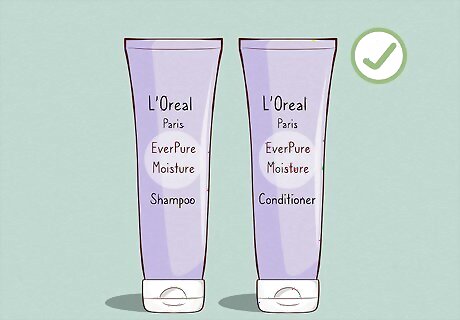
Harsh shampoos and conditioners break down your hair. That's because they often contain sulfates, which damage the hair cuticle and dry out your hair. To give your hair the hydration it needs, pick a moisture-rich, sulfate-free shampoo and conditioner. For an inexpensive option safe for color-treated hair, try L'Oreal Paris EverPure Moisture Shampoo and Conditioner. If you're looking for a moisture-rich option for natural hair, consider Mielle Organics Babassu Conditioning Shampoo.
Deep condition your hair once a week.
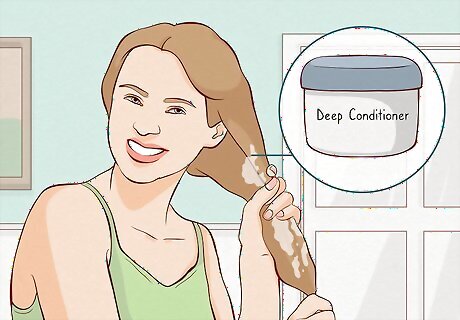
Deep conditioners contain moisturizing properties to help dry hair. Deep conditioning your hair can give your hair more emollients, which moisten dry hair and prevents breakage. To deep condition your hair, purchase a deep conditioner and apply it to your hair weekly. Opt for a product that contains shea butter, honey, or avocado. You might try Shea Butter Deep Moisturizing Hair Masque.
Wrap wet hair in a microfiber towel.
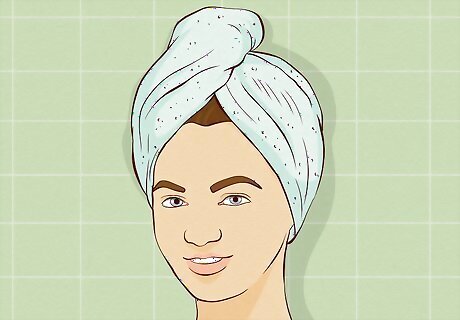
Rubbing your hair dry with a towel can lead to breakage. To dry your hair when you step out of the shower, it's important to treat your hair gently. Simply wrap your hair in a microfiber towel and wait for it to dry. If you have time, you can also air-dry your hair as an alternative.
Reduce heat styling.
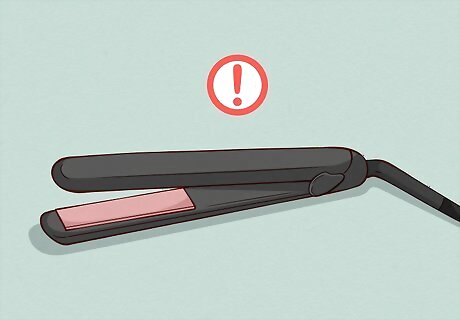
Use the lowest setting and heat style no more than once a week. As you may know, heat styling damages your hair and can lead to breakage over time. To reduce its impact, use the lowest possible setting on your heat styling tools and keep heat styling to once-a-week tops. When you do heat style, spray heat protectant throughout your hair and at the top of your head to minimize damage.
Dye your hair less frequently.
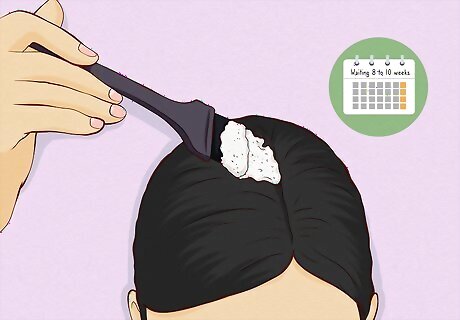
Root touch-ups can cause breakage at the crown. If you regularly dye your hair, try increasing the length of time between touch-ups. Waiting 8 to 10 weeks, especially in the dry, winter months, can prevent future breakage. Hide your roots in between touch-ups by using root concealer. To protect your hair from any further damage, consider growing out your natural hair color.
Use gentle accessories and styling methods.
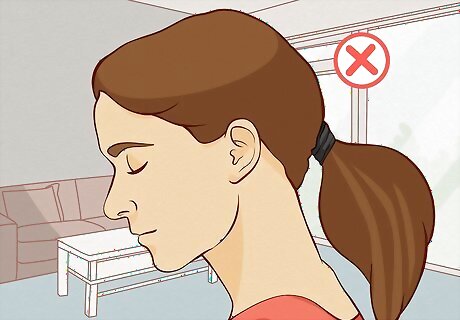
Tight hair ties and clips create tension that can break your hair. If you frequently pull your hair back in a tight ponytail or leave barrettes, hair clips, or bobby pins in all day, your hair may be breaking under the stress. Give your hair a break by tying it back in a scrunchie instead. Then, minimize how often you wear hair accessories that pull your hair.
Get a hair trim.
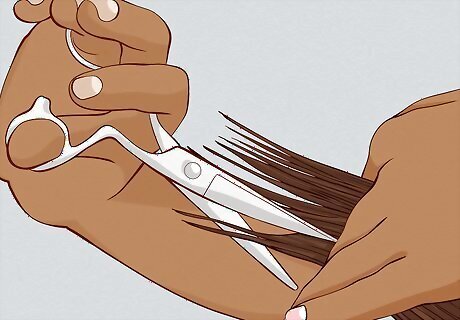
A trim can reduce the appearance of breakage. Visit a hairstylist and ask them to even out your hair in the places where breakage is present. Regular trims are also a helpful way to prevent future breakage by trimming split ends and promoting healthy growth. If you're comfortable, you can also trim your hair at home.
Use moisturizing hair oil to hide the breakage.
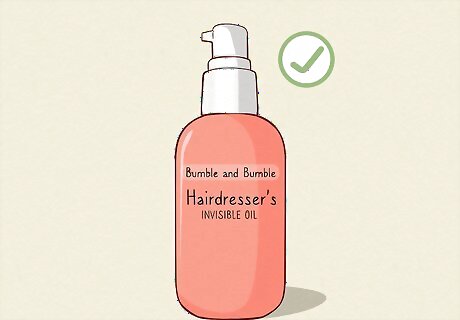
Hair oil makes damaged hair appear sleek and shiny. To oil your hair, opt for one with moisturizing properties like argan oil, rosemary oil, or black seed oil. These hair oils prevent hair loss in addition to moisturizing dry hair. To get glossy, healthy-looking hair, try Bumble and Bumble Hairdresser's Invisible Oil.
Minimize time under the sun.

Direct sunlight can cause breakage due to exposure to UV rays. Since the top of your head gets the most sunlight, you may experience more breakage there. To reduce hair breakage caused by the sun, spend less time in direct sunlight, wear a wide-brimmed hat when you're out and about, or spray your hair with a UV protectant. UV rays break down the cuticle, which is your hair's outer layer. This can weaken your hair strands and cause them to break over time. If you're looking for a UV protectant that will also give you beachy waves, try Sun Bum Sea Spray. To protect your hair and scalp from UV rays, go for Coola Scalp & Hair Mist.
Reduce stress.

Chronic stress can lead to breakage and hair loss. When you're under a lot of stress, your body triggers your hair follicles to rest (which is a process called telogen effluvium). This causes hair that's in the middle of the growth cycle to break prematurely, and it can lead to hair loss over time. Here are some ways you can reduce stress: Get at least 7 hours of sleep every night Exercise regularly Practice taking deep breaths Journal to clear your head Listen to calming music
Talk to your doctor.
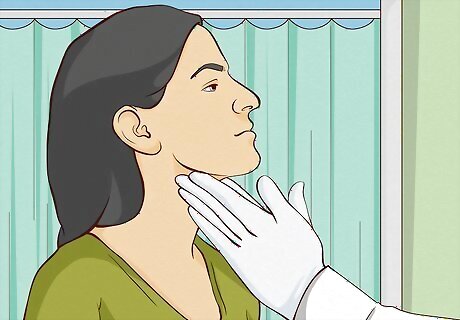
Hair breakage is one of the symptoms of thyroid disorders. If your hair breakage is accompanied by symptoms like thinning hair, hair loss, fatigue, thinning skin, and sudden weight loss, contact your doctor. It's possible you may be living with a thyroid condition like hyperthyroidism. A doctor can give you a proper diagnosis and start you on a treatment plan that is right for you. To diagnose hyperthyroidism, your doctor will examine your thyroid gland to see if it is tender, lumpy, or larger than usual. They may run blood tests to make a formal diagnosis.
Eat a nutrient-rich diet.
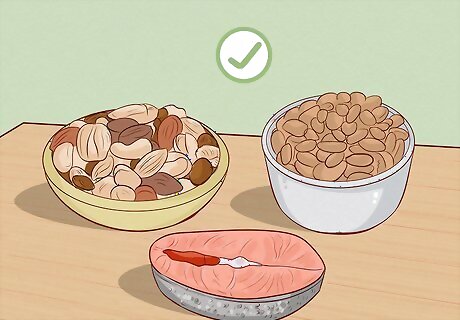
Increase your intake of biotin, omega-3s, iron, and zinc. These nutrients are part of a well-balanced diet and can help promote healthy hair growth. Eat healthy by eating nutritious lean proteins like chicken, fish, beans, and nuts. Boost your omega 3 intake by eating foods high in healthy fats like avocado and nut butter. Eating more iron-rich foods and increasing your zinc intake can also help prevent future breakage. Supplement your diet by taking vitamin supplements. Talk to your doctor first about taking biotin, iron, zinc, and omega-3 supplements.














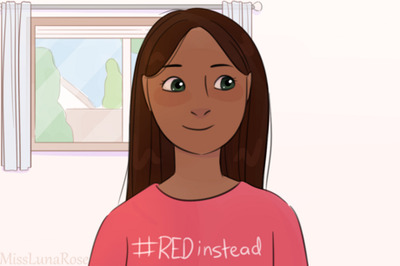


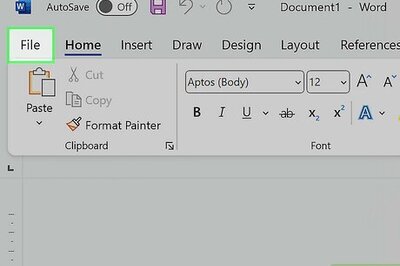
Comments
0 comment